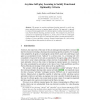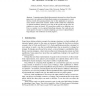64 search results - page 1 / 13 » Learning to commit in repeated games |
ATAL
2006
Springer
13 years 8 months ago
2006
Springer
Learning to converge to an efficient, i.e., Pareto-optimal Nash equilibrium of the repeated game is an open problem in multiagent learning. Our goal is to facilitate the learning ...
ICML
2010
IEEE
13 years 5 months ago
2010
IEEE
This paper experimentally evaluates multiagent learning algorithms playing repeated matrix games to maximize their cumulative return. Previous works assessed that Qlearning surpas...
ALDT
2009
Springer
13 years 11 months ago
2009
Springer
We present an anytime multiagent learning approach to satisfy any given optimality criterion in repeated game self-play. Our approach is opposed to classical learning approaches fo...
SAGT
2009
Springer
13 years 11 months ago
2009
Springer
Computing optimal Stackelberg strategies in general two-player Bayesian games (not to be confused with Stackelberg strategies in routing games) is a topic that has recently been ga...
AAAI
2011
12 years 4 months ago
2011
Automated agents for electricity markets, social networks, and other distributed networks must repeatedly interact with other intelligent agents, often without observing associate...


